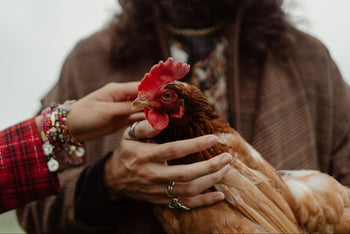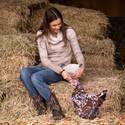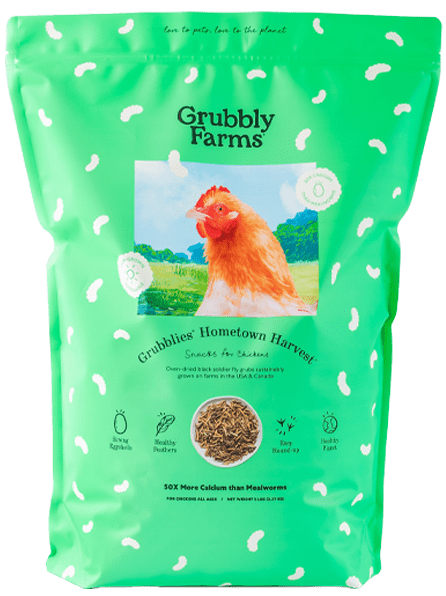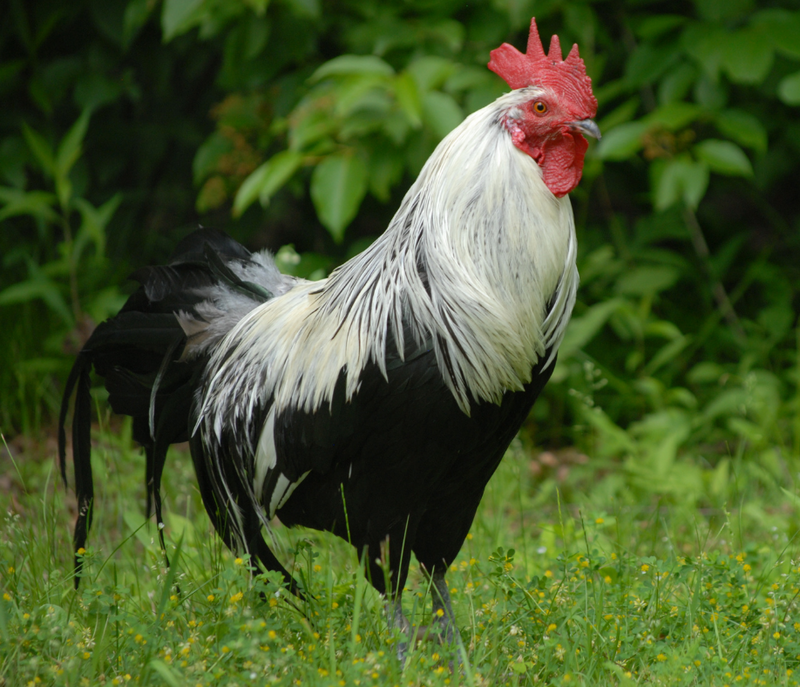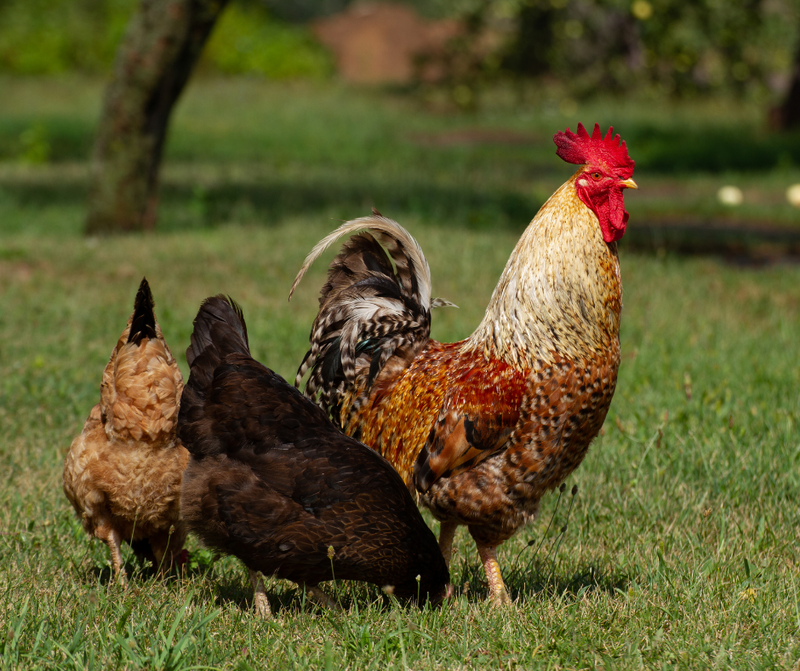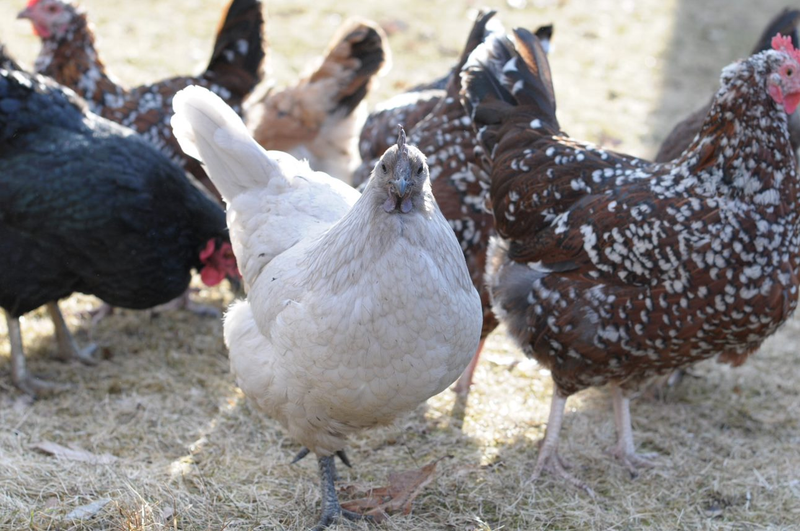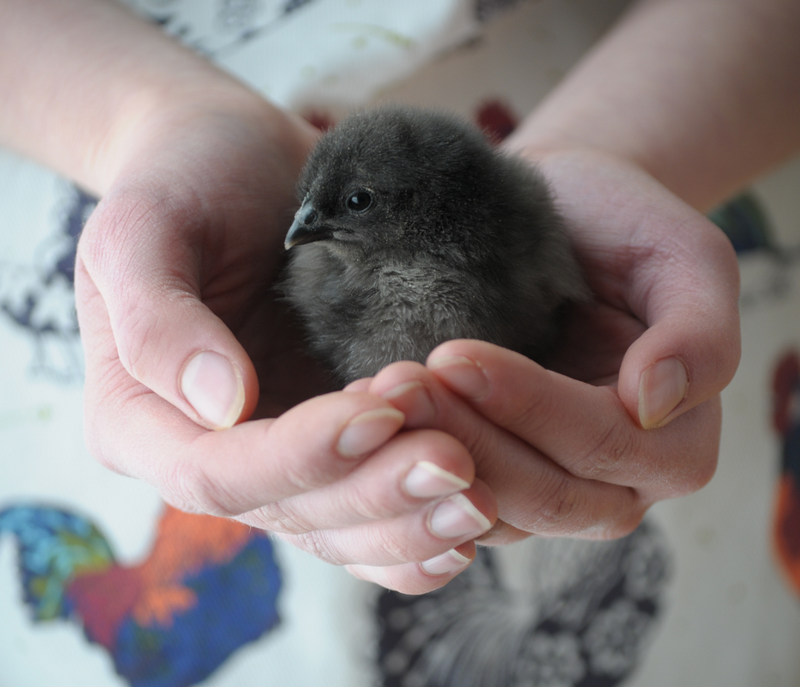Roosters often get a bad rap in the chicken world. This is often undeserved, but there are times when roosters can cause be both intimidating and even harmful. So, the first thing to note is aggressive roosters are not trying to be mean–they are simply performing instinctual behaviors that would have ensured their survival in the wild. An aggressive rooster is usually just trying to protect his flock or establish his dominance.
However, when a rooster enacts aggressive behaviors, it can be damaging for the hens and dangerous for you (or others). There are several ways you can deal with an aggressive rooster to help you stay safe and raise a peaceful flock.
Why Do Roosters Attack?

A rooster will attack or fight for two reasons: to defend his flock or to assert his dominance. Roosters who fight each other are usually trying to establish where they land in the pecking order and determine who will have the most privileges with the hens.
A rooster will attack a person or another animal if they perceive them as a threat to the safety of the flock. In some cases, a rooster will attack you if he is trying to establish dominance over you as a member of his flock.
Some breeds are more likely to be aggressive than others. Choosing a chicken breed known to be docile and friendly minimizes your chances of ending up with an aggressive or assertive rooster. However, keep in mind that every chicken has its own personality and even friendly breed roosters can be aggressive.
What Does a Rooster Attack Look Like?
Since roosters (like all chickens) are prey animals, they have several mechanisms of defense that they use when attacking or fighting. One line of defense is called ‘flogging,’ which is when a rooster uses his wings to beat the attacker or opponent. A rooster will also use his spurs to rake his opponent or attacker and use his beak to peck, grip, and injure. If he is able to defeat his opponent, he will also chase and aggressively peck the individual he has conquered.
What Are the Signs of an Aggressive Rooster?
In general, a rooster will not attack without giving some warning. If you are watching your rooster, you may notice a few body language cues or behaviors that will warn you he is thinking about attacking:
- Lowered head
- Foot stamping
- Raised hackle feathers (neck feathers)
- Bringing ‘presents’ (a rooster will do this to bring his opponent closer or to entice subordinate hens for mating)
- Mock charges
- Intensive staring
If you recognize these behaviors, you will want to respond with your own body language to deter the attack or at least be prepared to deal with the rooster when he does attack.
What to do with an Aggressive Rooster

More than likely you won’t be able to tell if your rooster is going to be aggressive until he’s fully grown. Aggressive behaviors are usually brought on by hormones that start kicking in when the rooster is about 16 weeks of age. All roosters experience these hormones, which are essential for a rooster to protect, defend, and mate with the hens in his flock.
One way to help avoid having a chick develop into a mean rooster is by handling your chicks regularly and hand-feeding them tasty snacks. Roosters who are handled at a young age and see you as a provider (source of food) will be less likely to see you as a threat or as someone to dominate as they mature.
7 Best Rooster Management Practices
There are also some other management practices you can implement to help a rooster feel more secure about his role in the flock–and have a better understanding of your role in the flock as well:
1. Commit to Mental Stimulation
Sometimes mental stimulation like daily healthy snacks, interactive toys, and the opportunity to free-range can distract a rooster from aggressive behaviors.
2. Provide Plenty of Space
Don't crowd an assertive rooster. Make sure your coop and enclosure provide plenty of space for your flock. When you are around your rooster, respect his space and give him room to avoid you.
3. Remain Calm
Don't act threatening toward a rooster or his flock. Avoid chasing his hens to catch them or performing stealthy behaviors that could be taken as the stalking of a predator. Just be calm and make sure your rooster is aware of your presence. Talking to him in a calm voice can help.
4. Maintain a Proper Hens-to-Rooster Ratio
A rooster can be aggressive if he doesn’t have enough hens to watch over. Try to have an average of 10 hens per 1 rooster. Light-breed roosters tend to like more hens than heavy-breed roosters.
5. Get Another Rooster
Having another rooster in the flock can help a rooster better understand his role in the flock, whether it be as head rooster or as subordinate rooster.
6. Hand-Feed Snacks
This is a good practice to start at a young age and continue as your rooster matures. Let him (and his hens) learn that you are a provider for the flock too and will bring him tasty snacks and treats.
7. Handle Your Rooster
Holding an aggressive rooster frequently can sometimes teach him that you are not a threat and that you are above him in the ‘pecking order.’
Making the Decision to Rehome a Rooster
If your aggressive rooster has turned into a downright mean rooster and is a threat to you or your family and friends, you may consider rehoming him. An aggressive rooster can sometimes be brought down a peg when he is moved to different surroundings or put into a flock that already has an assertive head rooster.
Folks who have large, free-range flocks may be open to accepting another rooster as an additional protector for their flock.
How to Catch an Aggressive Rooster

Catching an aggressive rooster can be tricky. You don’t want to harm him or yourself. You also don’t want to further establish that you are a threat to him by chasing him or handling him roughly.
Wait Until Sundown
The best way to catch an aggressive rooster is to do so after your flock has roosted for the night. Chickens can’t see very well in the dark and are usually calm and relaxed when they are roosted. First, you will want to dress for the occasion.
Protect & Equip Yourself
Since you are dealing with an aggressive rooster, you will want to wear gloves and long sleeves to protect yourself in case he decides to peck you. You will also want a flashlight.
If there is someone you can ask to help, you will find the extra set of hands come in handy. Just be sure to brief them on the plan.
Capturing the Rooster
Use a flashlight to locate the rooster on the perch in the coop. Gently grasp both of his wings firmly to prevent him from flapping. If you can, firmly hold him against your body with one hand and firmly grasp both of his legs with your other hand. His wings should be secured against your body with your one hand and his legs secured with your other hand. If you think he will try to peck, hold him firmly at arms-length, instead.
You can then transfer the rooster to a safe cage or pen if you need to separate him from the flock.
What to do if a Rooster Attacks You

It can be frightening when a rooster charges or even attacks you. However, the key to reacting to an aggressive rooster is to stay calm and stand your ground. You want the rooster to learn that you will not back down when he tries to attack you and that you are boss over the flock.
Furthermore, you want to assert your dominance in a non-abusive way. A fearful rooster will still see you as a threat to his flock or as subordinate to him. Instead, you assert your dominance by speaking his language. Your body language can communicate a lot to a rooster.
How to Stand Your Ground Against a Rooster
When you see the signs of an imminent attack, stand your ground and don’t back off. If possible, take one step towards him, which tells him you're in the game and not backing down. Taking a step towards your aggressive rooster can also precipitate an attack, so be prepared.
Either keep your eyes on the rooster or simply ignore him. Both are cues to the rooster that you are either confident in your status as flock boss. Maintain the dominant posture until he makes the first move. If he’s smart, he will back off and you have won that round!
What to do if the Rooster Doesn’t Back Down
If he decides to attack, you should be prepared and protected. Always wear long pants and tall boots when around your aggressive rooster.
You can also carry a deterrent in case he decides to attack. A safe deterrent for an aggressive rooster is a strong spray bottle full of water. Give him a spray of two from the bottle if he starts to attack.
Remember to be Patient
When teaching a mean rooster not to be aggressive toward you or other people, you will need to be consistent and patient. Have anyone who is around the rooster perform the same behaviors as you and carry a deterrent if necessary. You don’t want to confuse the rooster by having others react differently toward him, which can give him more confidence to attack.
Being consistent and persistent will hopefully discourage the rooster from continually attacking and will establish you (and other people) as safe but at the top of the ‘pecking order.’
How to Stop a Rooster from Attacking Your Hens

Sometimes a rooster is not aggressive towards you, but he can be assertive with the hens. An assertive rooster will often take his role of mating too seriously in the flock. Hens that get the brunt of his attention may try to avoid him and can often end up looking rough and tattered–even injured.
There are several ways you can protect your hens from an assertive rooster:
- Hen Saddles: Hen saddles are pieces of cloth that strap around a hen’s shoulders to protect her back feathers when a rooster mounts her for mating.
- Trim His Spurs: If your rooster has long, pointy spurs, you may consider trimming the spurs or taping some cushioning over the spur tips to prevent them from scratching the hens when he mates. When trimming a rooster’s spurs, make sure you only trim the tip a little bit at a time to prevent cutting the nerve inside the spur, which will bleed profusely if clipped. Keeping BleedStop or Wound Seal nearby can be handy.
- Rooster Jail: Putting your rooster in ‘rooster jail’ can give the hens a break from his attention. Rooster jail is a pen or cage that keeps your rooster separate from the hens but still provides him with protection, food, and water. Allowing the rooster to interact with the hens through his cage or pen can be helpful for keeping him stimulated without allowing him to harass the hens.
Again, getting another rooster can also help balance out the hierarchy in the flock. When the head rooster has to be on guard against another rooster, he will take his role of flock protector more seriously. This may sound scary, but it’s not. He will divert his attention from harassing the hens to wooing them by finding grubs and tokens of affection since he wants them to like him more than the other rooster.
A Happy Roo Leads to a Happy Crew!

We sometimes mistake an aggressive rooster for a mean rooster, when really the rooster is just doing what comes naturally to him. All roosters will attack when threatened. Some roosters just have more of an assertive and aggressive personality than others.
The best approach to aggressive roosters is a proactive approach. Handle all of your chicks starting at a young age and feed them daily healthy snacks, like Grubblies, from your hand to teach them that you are not a threat. If you do end up with a rooster with an aggressive personality, remember to stand your ground and always act calmly around him and his hens. Most importantly, protect yourself and others by wearing the right clothes.





